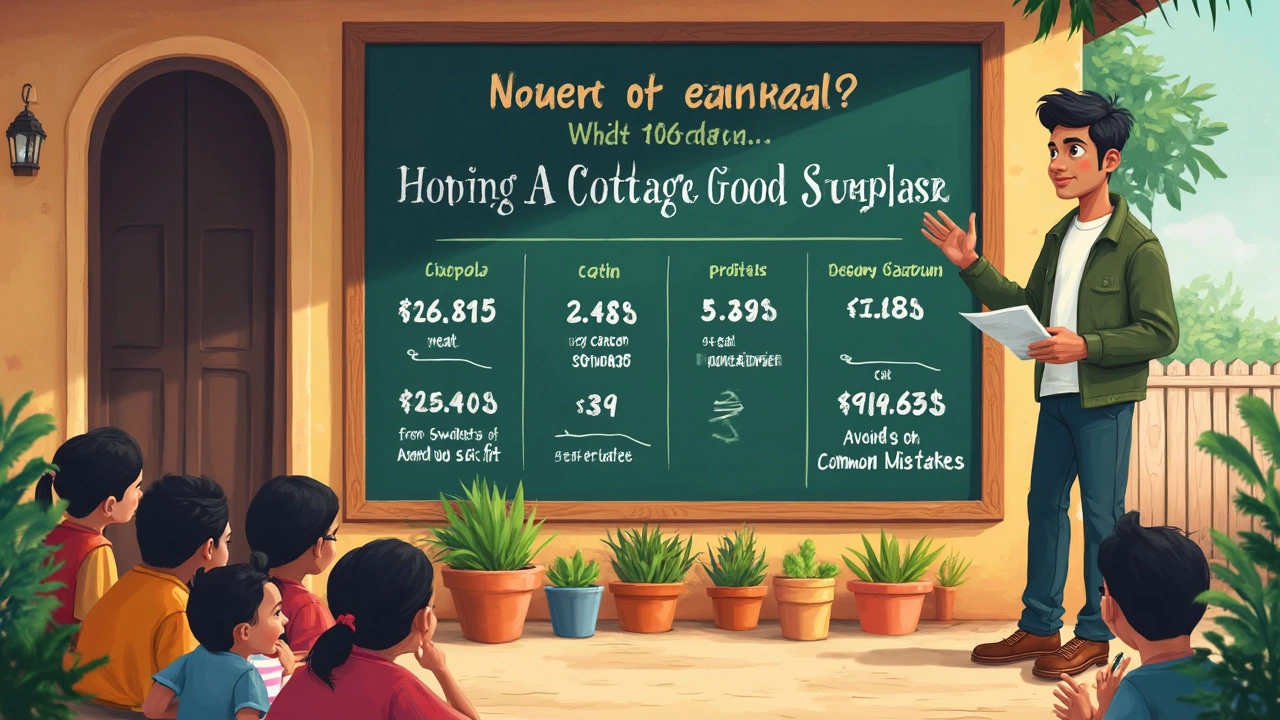Staring at that empty cottage you barely use? It might as well be sitting on a pile of cash. Some folks are making more in a week of summer rentals than they used to make in a month at their old jobs. We're not talking castle-sized places either—regular two-bedroom cottages can bring in real money, especially when you catch last minute bookers looking for a quick escape.
It's not just about tossing your keys to strangers and hoping for the best. The best returns come from knowing the seasons, picking the right platforms (Airbnb’s the easy button, but don’t sleep on niche sites like Sykes or Snaptrip), and actually understanding what guests want. Even if you think it’s too late in the year to grab bookings, last minute deals can fill every empty weekend—if you play it right.
- How People Profit From Cottages
- Last Minute Rentals: Goldmine or Gamble?
- What Owners Wish They Knew Beforehand
- Boost Your Bookings With Smart Moves
How People Profit From Cottages
So, how are people actually making money on cottages? The basics: you list your place online, set a nightly rate, and folks pay to stay. But there’s more to it than just posting a few photos. In the UK alone, short-term cottage rentals saw a 30% rise in bookings last year—most of it driven by staycations and flexible remote working. People are actively searching for last minute cottages, and that’s where owners are cashing in.
Owners typically make money two ways: weekend and holiday rentals, or season-long lets. A decent-sized cottage in a tourist hotspot like Cornwall or the Lake District can pull in £800-£1,200 a week in summer. Off-season, it drops, but last minute deals help keep the calendar full. Even outside those hot spots, if your cottage is close to any hiking trails, lakes, or has a cozy vibe, it can still earn well.
Here’s how many do it:
- List on multiple booking platforms: Don’t just use Airbnb. Mix in Booking.com, Vrbo, and UK-based sites like Sykes and Snaptrip to reach more guests.
- Offer flexible dates: Last minute bookings are popular with people looking for a quick break. Allow one or two-night stays, not just week-long blocks.
- Show off uniqueness: Got a firepit, hot tub, or dog-friendly policy? Call it out in your listing. These small things get a lot more interest.
- Set smart prices: Use tools like PriceLabs or Wheelhouse to adjust rates automatically based on demand—no more guessing.
Some owners don’t even live near their property. They hire a local cleaner and let a key-safe handle check-ins. It’s way more passive than most side gigs, and you can control when you block off time for your own use. Just remember: the best money comes when you keep your place looking good, reviews high, and your response time quick. That’s how you keep bookings (and income) rolling in.
Last Minute Rentals: Goldmine or Gamble?
Last minute cottage rentals can feel like a wild ride. Sometimes you rake in cash from panicked city dwellers trying to escape, other times you’re refreshing your phone, hoping someone bites. But here’s the real talk: if you handle it smart, last minute bookings can bump your earnings by 20-30% each month—according to rental platform Snaptrip, listings updated for last minute deals see twice as many inquiries.
But let's not pretend it's all upside. Cancellations sting, and you might have to drop your asking price if your weekend slot hasn't filled by Thursday. Especially in shoulder seasons, it can turn into a race against the clock. Still, folks who actively tweak their listing and monitor pricing usually win. As Sarah Townsend from Sykes Cottages puts it:
“Owners who stay flexible on pricing and respond quickly to last minute requests fill nearly 90% of their available nights during peak periods.”
Here’s what you need to know if you want to jump into last minute rentals:
- Keep your listing calendar up to date—instant bookers hate uncertainty.
- Toss in perks for last minute guests (fresh coffee, flexible check-in...it makes a difference!).
- Price drops after Tuesday for the coming weekend catch those last drifters scrolling for escapes.
- Reply in under an hour—even late at night. Hesitation costs bookings.
So, is it a goldmine or a gamble? Check this real data from the past year:
| Month | Avg. Last Minute Booking Rate (%) | Avg. Nightly Rate (£) | Occupancy Increase from Last Minute (%) |
|---|---|---|---|
| July | 43 | 145 | 28 |
| August | 48 | 154 | 31 |
| September | 32 | 117 | 16 |
If you want to make money on short notice, last minute renting isn’t just luck. It takes hustle, smart pricing, and flexibility, but the payoff can be bigger than waiting around for long-term guests to book months in advance.

What Owners Wish They Knew Beforehand
Most first-timers imagine easy money, but that’s only half the story. The behind-the-scenes reality? There’s a whole checklist owners stumble on—stuff most never hear about until it bites them.
First off, running a make money cottage rental involves more work than flipping a sign to “vacant.” Cleaning between guests is a must, and it’s not just quick tidy-ups. Think full sheet changes, deep sanitizing, and keeping outdoor spaces spotless, especially in busy summer months. Many owners get shocked at the cost and time this eats up.
Insurance is another one that catches people off guard. Regular homeowner’s insurance probably won’t cover you if you’re renting for cash. You’ll need holiday let insurance—higher price tag, but it covers damage, accidents, and lost income from cancellations.
Expect wear and tear to hit harder and faster than if you just used the cottage yourself. Stuff breaks, and it’s usually the stuff you wish didn’t: coffee makers, garden chairs, you name it. Smart owners budget for repairs like clockwork, not just when there’s a crisis.
- Be ready for last minute bookings that turn your Sunday quiet time into a rush to prep the place. Last minute deals are fantastic for getting cash, but only if you’re set up to pivot on short notice.
- Pricing is a moving target, especially for last minute renters. Nailing the right price takes watching other listings nearby and adjusting weekly, sometimes daily.
- Great photos and a killer description matter more than you’d think. Some owners wish they’d hired a pro sooner, because blurry cell phone snaps cost them bookings.
- Neighbors can make or break your vibe. Too many rowdy guests and you’ll hear about it fast. Clear house rules, available on booking platforms, help avoid drama.
Bottom line: if you plan out cleaning, insurance, pricing, photos, and clear guest rules before you list, you’ll dodge most of the headaches newbies regret. It’s not a walk in the park, but it pays for owners who treat it like a business from day one.
Boost Your Bookings With Smart Moves
If you want to actually see money coming in from your cottage, you can’t just list it and cross your fingers. People who really cash in are the ones who tweak things fast and pay attention to what guests care about.
The first thing: keep your calendar up to date, especially for last minute gaps. If you open up extra dates with less than seven days’ notice, most booking sites push you higher in their search results. This isn’t a maybe—it’s right there in the fine print on Airbnb and Booking.com.
Photos sell. Snapping a few with your phone won’t cut it. Real data shows that listings with at least 20 high-quality, well-lit photos get over 50% more clicks than basic listings. Make every room look inviting, and don’t skip the outside shots. Highlight cozy corners or anything unique, like hammocks or fire pits.
Guests love instant booking for last minute places. If you turn on this feature, you’ll pop up in every "book now" filter, which is where rushed families and couples land first. And their reviews can help you too—properties that average above 4.7 stars snap up nearly double the bookings during busy weekends.
Check out what really gets bookings moving:
- Lower your price by even 10% for last minute dates. You’ll climb the rankings and make up the discount with higher volume.
- Don’t charge extra fees for cleaning or pets. People looking for a quick stay avoid hidden costs more than anything.
- Set a two-night minimum stay instead of a week, especially off-season. More bookings, less wasted time.
- Keep response time under an hour, especially after 5pm when urgency spikes.
Here's what you might expect to make by acting on these moves, based on UK cottage rental averages in 2024:
| Booking Tactic | Extra Annual Income (GBP) |
|---|---|
| Instant booking enabled | +£1,300 |
| Last-minute discounting | +£900 |
| Minimum stay reduction | +£700 |
| Pro photos | +£1,100 |
These tweaks don’t take much time, but they’re the moves that separate average owners from those who really make money off cottages—especially when time is tight.
